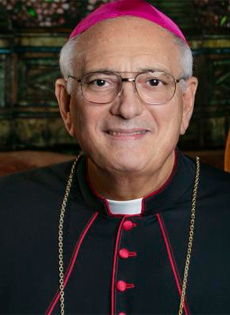
Defining immigration terms: Refugee, asylum-seeker and parole
Monday, February 12, 2024
*Bishop Nicholas DiMarzio
In the past two years, we have seen in the media two major refugee flows: first people fleeing Ukraine after the Russian invasion and more recently the Palestinian people moving from the north of Gaza to the south.
In the Palestinian migration, we saw many people using donkey carts to flee, reminding us of the refugee family of Nazareth that once fled on a donkey to Egypt by way of the Gaza Road to protect the child Jesus. Let us remember what this one migration event meant for the world.
In that light, it might be useful if we clarify terms used in the migration discussion that sometimes are confusing. They are labels put on people that do not correctly describe the reality of their lives.
The term “refugee” is enshrined in international law, defined as people fleeing war situations that threaten their lives. Unfortunately, in the past 100 years we have seen many refugee migrations, many escaping large conflicts, including the two world wars and numerous civil conflicts. Some on the move are called internally displaced people since they are moving within their own country, while those who cross an international border are called refugees. They face an imminent threat to their lives and well-being.
Asylum-seekers are refugees who arrive at another nation’s borders and request protection, often from war, but also from unjust conditions in their home countries. They enter another country seeking asylum, which is regulated by both international and domestic law.
Recently, our nation has witnessed a great influx of asylum-seekers coming from various places for many varied reasons. It is important that we name each group so that we understand them and come to different solutions. In my experience working with migrants for over 50 years, I have never met anyone who had fled their country — leaving everything behind — because they wanted to have a vacation.
The horrible life-threatening conditions that migrants have navigated during the past two years to find safety, such as walking for days through the Darién Gap between Colombia and Panama, or riding on top of “La Bestia” (The Beast), the cargo train in Mexico that starts in the Chiapas state in southern Mexico, near the Guatemalan border, show that they would rather leave the persecution in their countries than remain there. Immigration law allows our president to grant Temporary Protected Status, or TPS, to those seeking temporary asylum in the United States who flee from conditions of war and natural disaster. This designation can be given to nationals of a particular nation who arrived in the United States before a particular date.
Our country's immigration law has two ways of categorizing those not authorized to be there. First, there are those who Enter Without Inspection (EWI) and those who overstay their visas, or “visa overstayers.” The first category describes those who cross a border without being intercepted by U.S. Border Patrol, and the second describes those who usually come through our airports on a visitor’s visa or other visa but do not return home when their visa expires. Historically, more immigrants overstay their visas each year than cross the border illegally.
Another solution that has been used in the Afghan evacuation and Ukrainian war is called parole. By executive decision, the president can authorize a blanket entry into the United States based on humanitarian grounds, but it does not include a path to permanent residency, which at some point needs to be conferred by Congress.
Parole is used in emergency situations, such as the Afghanistan evacuation and for refugees fleeing the war in Ukraine. In fact, Afghan parolees do not have a permanent status and legislation in Congress — which would give them a green card — known as the Afghan Adjustment Act, is languishing.
Each year the president of the United States has the responsibility of setting a goal and budget for refugee resettlement within the country. These are refugees who have been processed overseas in their country of origin or more likely in second countries. They have requested resettlement and are identified and processed by the U.N. High Commissioner for Refugees and voluntary agencies, such as Migration and Refugee Services of the U.S. Conference of Catholic Bishops (USCCB). Once these people enter the United States, they are given assistance by resettlement groups, including faith-based organizations, to integrate into our country.
The Palestinian people in Gaza have been in refugee status for almost 70 years. A partition of Palestine took place after World War II to accommodate a Jewish homeland for refugees from the Holocaust. Many Palestinians were displaced and now live in the West Bank, Gaza, and other countries. A special division of the United Nations (UNWRA) is responsible for aiding these refugees, because permanent settlement in other Arab countries was promised but never allowed by those nations. The recent war points out again the necessity for a resolution to their tenuous status. If a two-state solution were eventually negotiated, they would have a Palestinian homeland.
The migration phenomenon is not easy to understand, but understanding it is not as important as our concern for those who seek protection for their families, especially for the many children involved in these migrant situations. Most migrants take the risks for the sake of their children, as Mary and Joseph did for Jesus. The example of the Holy Family of Nazareth should warm our hearts to reach out to those who need our help.


Comments from readers